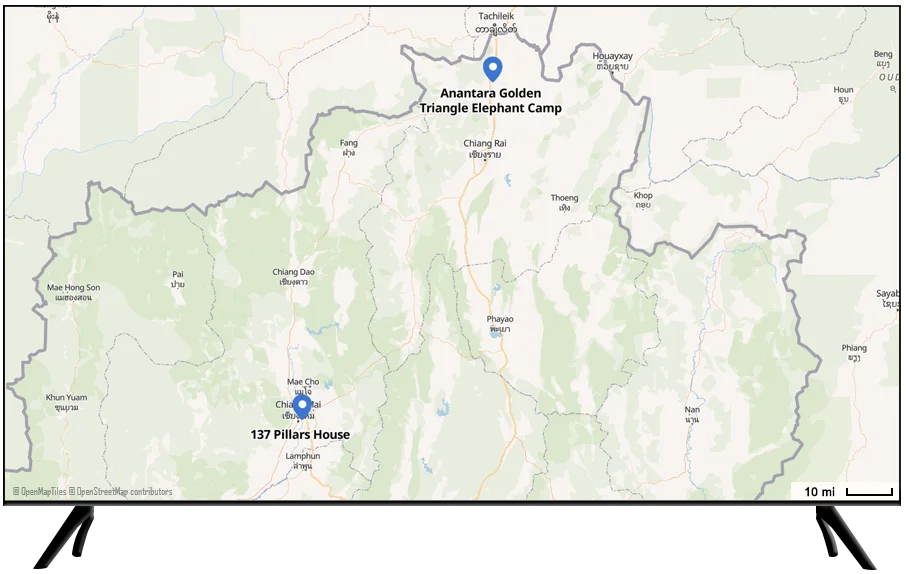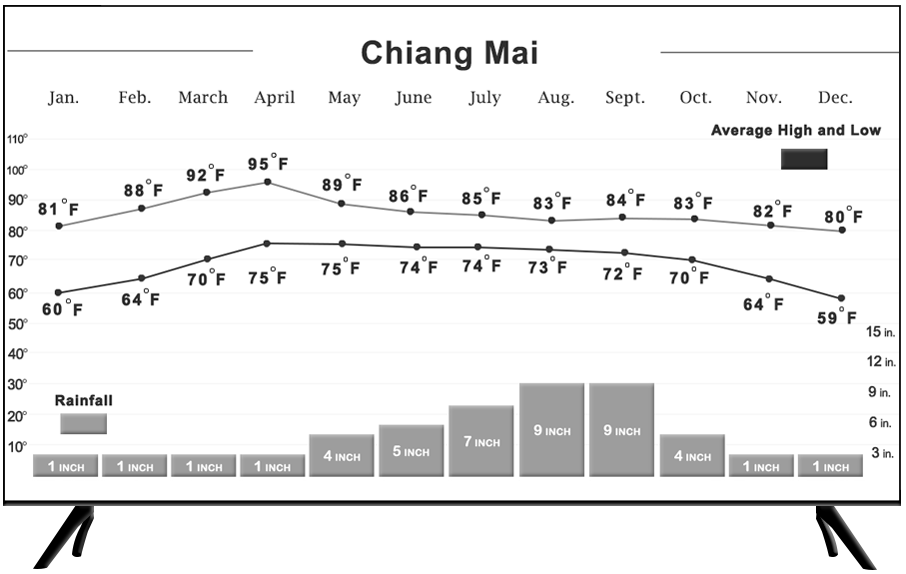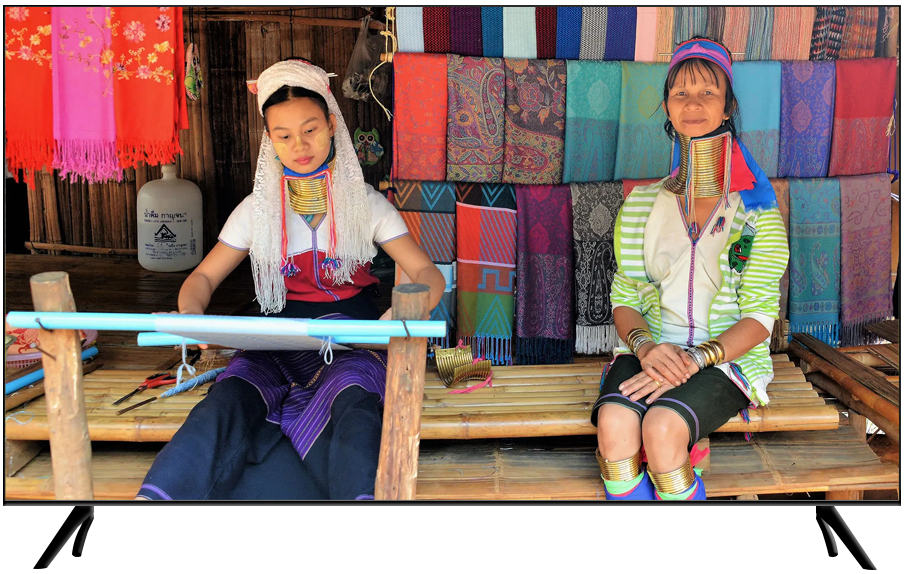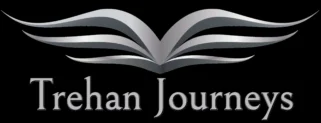


Day 6. Chiang Rai – Chiang Mai
Overnight – 137 Pillars House
Check-out of your resort by noon and join your Tour Director for the drive to a group of rural villages in the hills near Chiang Rai. You can enjoy lunch at your resort on self-pay basis before you depart, or have a late lunch break along the way.
Hill Tribes and today’s reality – many travel companies continue to paint a picture of the unique traditional clothing, jewelry, and lifestyles of Southeast Asia’s hill tribes as if these have remained unchanged over the last few decades. The truth is quite the opposite. The hill tribes were an integral part of poppy farming for a long time and supported themselves and their unique lifestyles through its cultivation. About six decades ago the revered late King of Thailand decided to end the drug trade in this region issuing a series of Royal Proclamations and Royal Projects to uplift and empower the tribal people. His goal was to provide them with alternative livelihoods and education for their children so that they could assimilate into the rest of Thailand’s population. Although some still live in their villages and farm, their lifestyles have changed; they dress like other Thai people do, practice modern cultivation methods, live in brick and mortar houses, speak the Thai dialect that is local to their region, ride motorbikes and drive pickup trucks as part of their daily routine.
There are a handful of locales where the tribal communities have been partially preserved in their original form with support from government funded agencies. The goal is to provide the few who do not want to change a place to live, while also making them self-sufficient. Our guests visit one of such small group of villages, located near Chiang Rai. During this excursion, you will pay a visit to the Kiran (longneck), Akka, Lahu, and Yao tribes. Your Tour Director will introduce you to some of the villagers and explain the origins and customs of these unique tribal peoples. These villagers still honor their heritage by dressing in the vibrant and colorful garments unique to their people. The entry fees to this set of villages supports the hill tribe residents of the village, and the tribal residents also offer hand crafted items for sale, although they are not the least bit aggressive in pushing their wares. A few people condemn such village tours as being degrading to the tribal people. They ignore the reality that this is still a good way for these few tribals to earn a living in the present, without completely changing their lifestyles. They also are educating visitors about their culture and customs.
In the mid-afternoon you will proceed on the scenic drive through the hills in the Chiang Rai region as you head to Chiang Mai. Arrive at Chiang Mai and you are assisted with your check-in at your boutique resort, which happens to be the best luxury lodging within Chiang Mai. Your small resort is a 20-minute walk (or 5-minute tuk-tuk ride, easily available) will take you to downtown Chiang Mai where there are scores of cafés, restaurants, and bars.
The Lanna Kingdom flourished in northern Thailand between the 12th – 15th centuries, and Chiang Mai was the longtime capital of the kingdom after it was moved from Chiang Rai. The city is the second largest city in Thailand, and the cultural capital of the north.
Possessing great natural beauty and a host of outdoor activities and parks on its outskirts, the city itself is a fascinating combination of unique architecture, ancient history with its associated rituals, and a modern metropolis. Chiang Mai is one of Asia’s best cities to explore on foot, with a bustling street food scene. Your hotel offers private Thai cuisine classes conducted by its master chefs and we can schedule one for you upon request.
Check-out of your resort by noon and join your Tour Director for the drive to a group of rural villages in the hills near Chiang Rai. You can enjoy lunch at your resort on self-pay basis before you depart, or have a late lunch break along the way.
Hill Tribes and today’s reality – many travel companies continue to paint a picture of the unique traditional clothing, jewelry, and lifestyles of Southeast Asia’s hill tribes as if these have remained unchanged over the last few decades. The truth is quite the opposite. The hill tribes were an integral part of poppy farming for a long time and supported themselves and their unique lifestyles through its cultivation. About six decades ago the revered late King of Thailand decided to end the drug trade in this region issuing a series of Royal Proclamations and Royal Projects to uplift and empower the tribal people. His goal was to provide them with alternative livelihoods and education for their children so that they could assimilate into the rest of Thailand’s population. Although some still live in their villages and farm, their lifestyles have changed; they dress like other Thai people do, practice modern cultivation methods, live in brick and mortar houses, speak the Thai dialect that is local to their region, ride motorbikes and drive pickup trucks as part of their daily routine.
There are a handful of locales where the tribal communities have been partially preserved in their original form with support from government funded agencies. The goal is to provide the few who do not want to change a place to live, while also making them self-sufficient. Our guests visit one of such small group of villages, located near Chiang Rai. During this excursion, you will pay a visit to the Kiran (longneck), Akka, Lahu, and Yao tribes. Your Tour Director will introduce you to some of the villagers and explain the origins and customs of these unique tribal peoples. These villagers still honor their heritage by dressing in the vibrant and colorful garments unique to their people. The entry fees to this set of villages supports the hill tribe residents of the village, and the tribal residents also offer hand crafted items for sale, although they are not the least bit aggressive in pushing their wares. A few people condemn such village tours as being degrading to the tribal people. They ignore the reality that this is still a good way for these few tribals to earn a living in the present, without completely changing their lifestyles. They also are educating visitors about their culture and customs.
In the mid-afternoon you will proceed on the scenic drive through the hills in the Chiang Rai region as you head to Chiang Mai. Arrive at Chiang Mai and you are assisted with your check-in at your boutique resort, which happens to be the best luxury lodging within Chiang Mai. Your small resort is a 20-minute walk (or 5-minute tuk-tuk ride, easily available) will take you to downtown Chiang Mai where there are scores of cafés, restaurants, and bars.
The Lanna Kingdom flourished in northern Thailand between the 12th – 15th centuries, and Chiang Mai was the longtime capital of the kingdom after it was moved from Chiang Rai. The city is the second largest city in Thailand, and the cultural capital of the north.
Possessing great natural beauty and a host of outdoor activities and parks on its outskirts, the city itself is a fascinating combination of unique architecture, ancient history with its associated rituals, and a modern metropolis. Chiang Mai is one of Asia’s best cities to explore on foot, with a bustling street food scene. Your hotel offers private Thai cuisine classes conducted by its master chefs and we can schedule one for you upon request.

